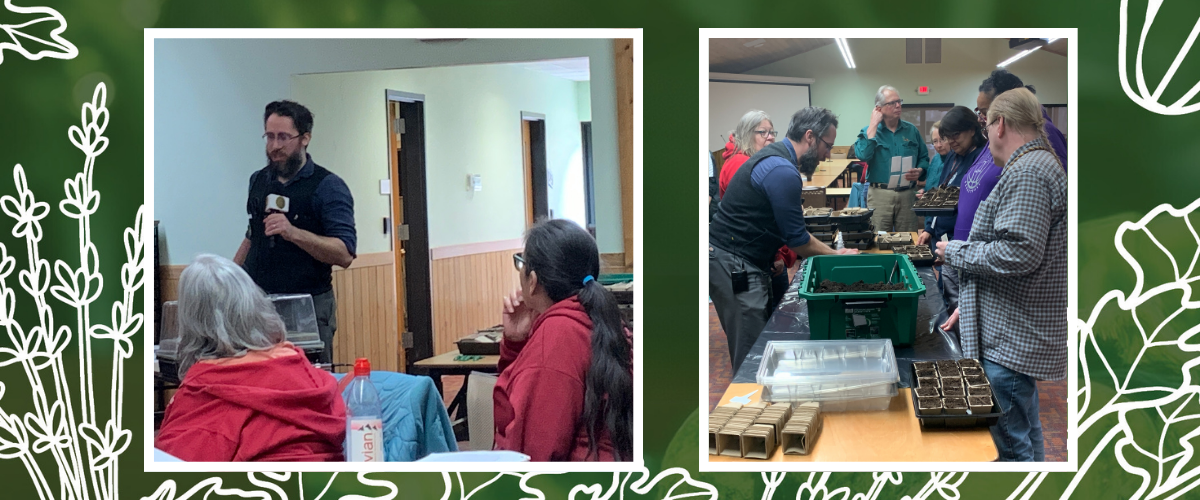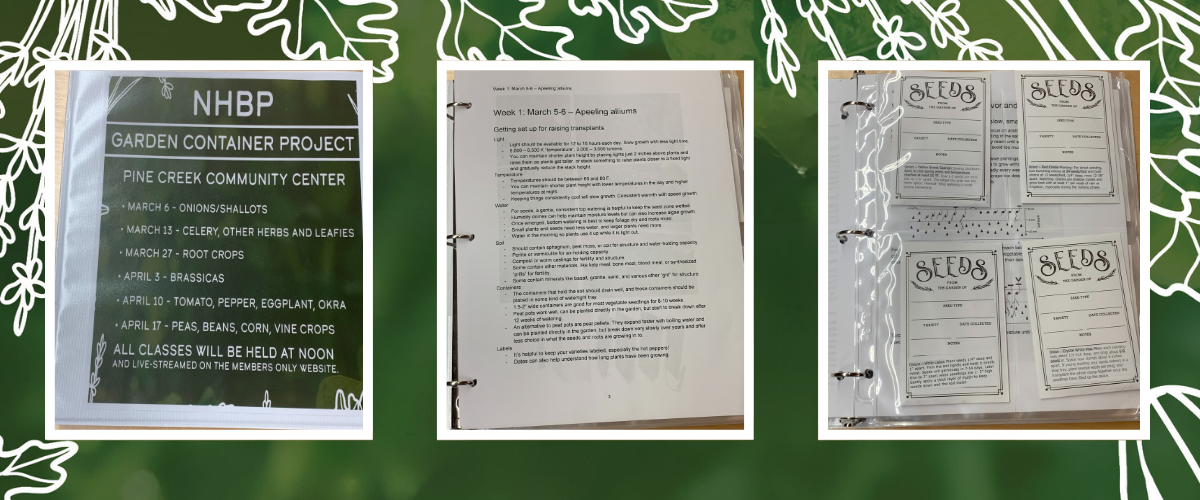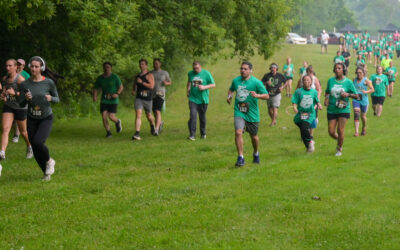Bringing Sustainability and Self-Sufficiency to the NHBP Community
“Let’s get educated and grow our own food,” said NHBP Tribal Member and Food Sovereignty Coordinator Nickole Keith in a social post leading up to the Lunch and Learn on Wednesday, March 6, at the Pine Creek Community Center.
NHBP’s weekly Lunch and Learn is sprouting new interests as the Tribe kicks off the 2024 Annual Garden Container project. In attendance for Week One were Tribal Members, NHBP Team Members, and special guest Vegetable Specialist Ben Phillips from the Michigan State University (MSU) Southwest Michigan Research and Extension Center.
“I’d like to thank Nickole for making this happen and for inviting me to be here; I feel very privileged,” said Phillips during his opening remarks.
Now in its third year, the Garden Container project started with a survey regarding Tribal Members’ interest and the likelihood of having gardens in their homes. The first two years focused on distributing raised garden beds and seeds to Elders. The seed program, which is available to everyone; has had over 120 people participating for the last two years.
Since its inception, the number of participants has steadily grown each year, all thanks to this project that stemmed from NHBP’s Food Sovereignty Program, led by Keith.
Food Sovereignty is the right of Indigenous nations to define their own diets and shape food systems that are congruent with their spiritual and cultural values. One of the keys to this is to consume as much locally sourced and traditional food as is feasible. Due to environmental changes, much of our traditional food is no longer readily available.
This project allows Tribal Members to learn how to plant, care for and harvest food from their gardens, raised beds and even on apartment patios.
“This is wonderful news that our Members want to grow and be a part of this program!” said Keith.
This year, the garden beds were available to NHBP families and Elders. To receive a garden bed, individuals had to register online. When registration opened, 40 spots were available, and all were quickly spoken for.
Registered participants who live within the 7-county service area will receive a semi-permanent 8-foot wooden raised garden bed, a binder containing the “Veg Out!” curriculum, and seeds to get them started. Keith is arranging for the garden beds to be delivered by the end of the month of March.
New this year, an interactive gardening series will be held during Lunch and Learns over the next two months.
To serve Tribal Members who live outside the 7-county service area, items were mailed to individuals so they could follow along during the teaching sessions. Each session is live-streamed to the Members Only website, allowing Tribal Members to tune in virtually.
Teaching sessions will be facilitated by Phillips, who is based out of Benton Harbor, Michigan, where he oversees a research farm.

NHBP is excited about this collaboration and the opportunity to create an educational space where members of the Community can come together and learn more about planting vegetables.
The “Veg Out!” 6-week curriculum is a new set of information intended to train gardeners on the best timing, production methods and more. Developed and written by Phillips, this is the same material used to teach courses at MSU. Phillips tweaked the curriculum to fit the specific needs of NHBP Garden Container Project and to make the learning more interactive.
If participants follow along and start vegetable seeds or make seed tapes with Phillips over the course of the next six weeks, they will then be able to plant them out in a frost-free situation at the appropriate plant ages for maximum success.
Those who attend will learn about the origins and cultural significance of different vegetables, understand how different vegetable seeds need to be planted and when, be able to develop an individualized system for raising young seedlings, observe their plants as they grow and discover how to keep them alive until planting time.
“It’s going to be fun; I am really excited about this,” said Keith.
The amount of preparation that went into preparing for this program was no small feat.
“Thank you to everyone who has supported this program and helped out; I am very grateful for all the help leading up to this day,” said Keith, “This is a big task to take on.”
Together, the Culture Department and Keith worked hard to prepare for this project. It was all hands on deck as NHBP employees across various departments assisted.
NHBP Front Desk Receptionist Tabatha Gordy and NHBP Tribal Member and Purchasing Agent Linda Rice played a huge role in helping Keith organize and assemble the “Veg Out!” curriculum binder.
“I showed Linda the binder, and she took matters into her own hands. It was like she really read my mind!” said Keith during a Facebook live video.
“I initially asked her to order the seeds months ago; however, we didn’t order nearly enough. She put in the order of bulk seeds from reading the curriculum. Then, the sleeves were ordered to protect the pages, and seed packets were ordered to store the individual seeds. She assembled 30 binders, allowing our Members to feel like they are really attending a class at MSU!”

Although registration is now closed for the raised garden bed deliveries, NHBP Tribal Members interested in following along and learning from Phillips’s “Veg Out!” curriculum are welcome to join virtually, as the teachings will be live-streamed onto the Members Only website.
A printable version of the “Veg Out!” curriculum and the course agenda for the next two months can also be found on the Announcements Page on the Members Only website.
Projects like these allow for a better sense of Community and individuals to take the knowledge shared and make more sustainable decisions for the next Seven Generations. NHBP is committed to furthering its work to become a healthier and self-sufficient Community.
If you haven’t already, be sure to join the NHBP Food Sovereignty Facebook group, where Keith has developed an engaged following and shares tasty recipes and information on how to incorporate food sovereignty traditions back into your diet.




0 Comments